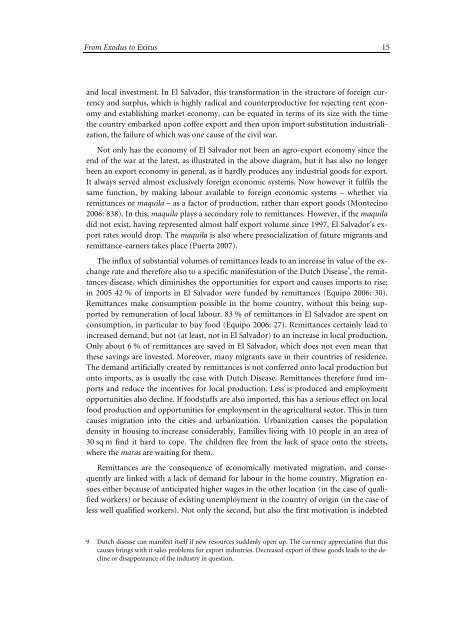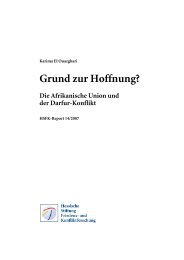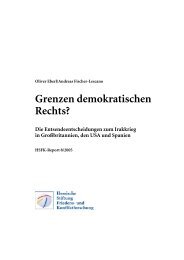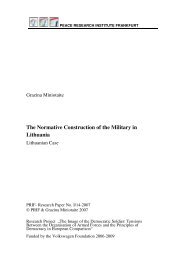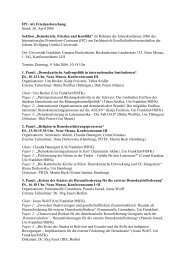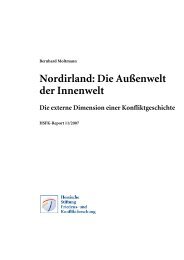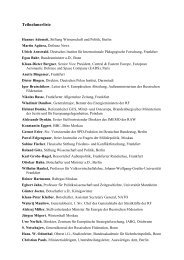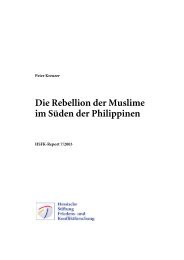From Exodus to Exitus Causes of post-war violence in El ... - eDoc
From Exodus to Exitus Causes of post-war violence in El ... - eDoc
From Exodus to Exitus Causes of post-war violence in El ... - eDoc
You also want an ePaper? Increase the reach of your titles
YUMPU automatically turns print PDFs into web optimized ePapers that Google loves.
<strong>From</strong> <strong>Exodus</strong> <strong>to</strong> <strong>Exitus</strong> 15<br />
and local <strong>in</strong>vestment. In <strong>El</strong> Salvador, this transformation <strong>in</strong> the structure <strong>of</strong> foreign currency<br />
and surplus, which is highly radical and counterproductive for reject<strong>in</strong>g rent economy<br />
and establish<strong>in</strong>g market economy, can be equated <strong>in</strong> terms <strong>of</strong> its size with the time<br />
the country embarked upon c<strong>of</strong>fee export and then upon import substitution <strong>in</strong>dustrialization,<br />
the failure <strong>of</strong> which was one cause <strong>of</strong> the civil <strong>war</strong>.<br />
Not only has the economy <strong>of</strong> <strong>El</strong> Salvador not been an agro-export economy s<strong>in</strong>ce the<br />
end <strong>of</strong> the <strong>war</strong> at the latest, as illustrated <strong>in</strong> the above diagram, but it has also no longer<br />
been an export economy <strong>in</strong> general, as it hardly produces any <strong>in</strong>dustrial goods for export.<br />
It always served almost exclusively foreign economic systems. Now however it fulfils the<br />
same function, by mak<strong>in</strong>g labour available <strong>to</strong> foreign economic systems – whether via<br />
remittances or maquila – as a fac<strong>to</strong>r <strong>of</strong> production, rather than export goods (Montec<strong>in</strong>o<br />
2006: 838). In this, maquila plays a secondary role <strong>to</strong> remittances. However, if the maquila<br />
did not exist, hav<strong>in</strong>g represented almost half export volume s<strong>in</strong>ce 1997, <strong>El</strong> Salvador’s export<br />
rates would drop. The maquila is also where presocialization <strong>of</strong> future migrants and<br />
remittance-earners takes place (Puerta 2007).<br />
The <strong>in</strong>flux <strong>of</strong> substantial volumes <strong>of</strong> remittances leads <strong>to</strong> an <strong>in</strong>crease <strong>in</strong> value <strong>of</strong> the exchange<br />
rate and therefore also <strong>to</strong> a specific manifestation <strong>of</strong> the Dutch Disease 9 , the remittances<br />
disease, which dim<strong>in</strong>ishes the opportunities for export and causes imports <strong>to</strong> rise:<br />
<strong>in</strong> 2005 42 % <strong>of</strong> imports <strong>in</strong> <strong>El</strong> Salvador were funded by remittances (Equipo 2006: 30).<br />
Remittances make consumption possible <strong>in</strong> the home country, without this be<strong>in</strong>g supported<br />
by remuneration <strong>of</strong> local labour. 83 % <strong>of</strong> remittances <strong>in</strong> <strong>El</strong> Salvador are spent on<br />
consumption, <strong>in</strong> particular <strong>to</strong> buy food (Equipo 2006: 27). Remittances certa<strong>in</strong>ly lead <strong>to</strong><br />
<strong>in</strong>creased demand, but not (at least, not <strong>in</strong> <strong>El</strong> Salvador) <strong>to</strong> an <strong>in</strong>crease <strong>in</strong> local production.<br />
Only about 6 % <strong>of</strong> remittances are saved <strong>in</strong> <strong>El</strong> Salvador, which does not even mean that<br />
these sav<strong>in</strong>gs are <strong>in</strong>vested. Moreover, many migrants save <strong>in</strong> their countries <strong>of</strong> residence.<br />
The demand artificially created by remittances is not conferred on<strong>to</strong> local production but<br />
on<strong>to</strong> imports, as is usually the case with Dutch Disease. Remittances therefore fund imports<br />
and reduce the <strong>in</strong>centives for local production. Less is produced and employment<br />
opportunities also decl<strong>in</strong>e. If foodstuffs are also imported, this has a serious effect on local<br />
food production and opportunities for employment <strong>in</strong> the agricultural sec<strong>to</strong>r. This <strong>in</strong> turn<br />
causes migration <strong>in</strong><strong>to</strong> the cities and urbanization. Urbanization causes the population<br />
density <strong>in</strong> hous<strong>in</strong>g <strong>to</strong> <strong>in</strong>crease considerably. Families liv<strong>in</strong>g with 10 people <strong>in</strong> an area <strong>of</strong><br />
30 sq m f<strong>in</strong>d it hard <strong>to</strong> cope. The children flee from the lack <strong>of</strong> space on<strong>to</strong> the streets,<br />
where the maras are wait<strong>in</strong>g for them.<br />
Remittances are the consequence <strong>of</strong> economically motivated migration, and consequently<br />
are l<strong>in</strong>ked with a lack <strong>of</strong> demand for labour <strong>in</strong> the home country. Migration ensues<br />
either because <strong>of</strong> anticipated higher wages <strong>in</strong> the other location (<strong>in</strong> the case <strong>of</strong> qualified<br />
workers) or because <strong>of</strong> exist<strong>in</strong>g unemployment <strong>in</strong> the country <strong>of</strong> orig<strong>in</strong> (<strong>in</strong> the case <strong>of</strong><br />
less well qualified workers). Not only the second, but also the first motivation is <strong>in</strong>debted<br />
9 Dutch disease can manifest itself if new resources suddenly open up. The currency appreciation that this<br />
causes br<strong>in</strong>gs with it sales problems for export <strong>in</strong>dustries. Decreased export <strong>of</strong> these goods leads <strong>to</strong> the decl<strong>in</strong>e<br />
or disappearance <strong>of</strong> the <strong>in</strong>dustry <strong>in</strong> question.


